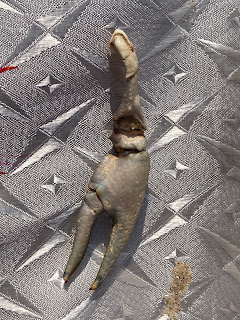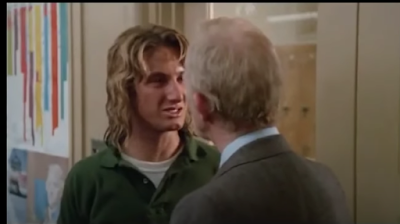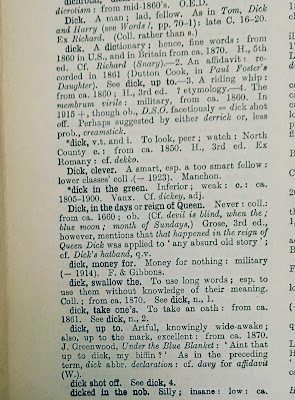 |
| Photo by Caren Jeskey |
Today is Saturday, which means it's time for the weekly update by our intrepid Northern Suburban Correspondent, Caren Jeskey, who isn't about to let even the briefest window of pre-spring good weather slip by without seizing the opportunity. Her report:
By Caren Jeskey
Sunny and 67? Yes! Last Saturday I was overjoyed to have a day of warmth to interrupt the long abyss of winter. I have to hand it to anyone who manages to stay active during a Midwest cold season. I thought I would, but I’ve had more days cozy on the couch than not. To celebrate, I decided to hop on my bike. Poor thing’s not had a turn of the wheel in too many months. It took longer to get out than I’d expected. Finally, tires pumped up, helmet on, bike lights with fresh batteries, backpack with water and snacks, I set off from home for the big city.
I biked east to Sheridan Road, eager to see the melting mini glaciers on the lake. I pedaled past a kindly looking older man on a brisk walk, his spine curved into a deep C. I wondered how much it bothered him to get such a good look of the ground these days. I rode onto the concrete overlook at Kenilworth Beach and peered over the edge. I felt proud to see a small chunk of ice still clinging to the pier. Well done, you!
I snapped pictures of the last vestiges of the big freeze and got back on my bike. I had 8 miles or so to go to reach Loyola Beach in Chicago where I was meeting a friend. Spandex clad riders swooshed past me. I admired their sinew, camaraderie and chutzpah. I thought “maybe one day that will be me!” though that's unlikely.
There was a gale wind advisory which made the trip a little more challenging.
When I made it to the fieldhouse on Greenleaf I got a text from my friend. “I have to go home and change socks and shoes. A wave totally got me.” This gave me time to silently marvel at the straw colored prairie grasses flapping in the wind, surrounded by rippled sand dunes and the bright blues of the lake just beyond.
When my friend made it back, we ventured out onto the sand and spread out the tablecloth I’d brought, listened to some music and stared at the waves.
I noticed a big purple claw in the sand and felt all of the excitement of a childhood treasure hunt. I wondered if someone had eaten a meal in this spot earlier, leaving the dismembered leg behind. Then it sunk in. There are creatures, many creatures, that I know nothing about in this fabulous Great Lake system, right under our noses. There is much to learn. I put the claw in my fanny pack.
There was a bit of excitement when a man placed his jacket down on the pier, and a strong gale took it right into the lake. He was quite upset, as it was his nice down parka and had a good bit of cash in it. A small crowd gathered and an avid swimmer let us know that there was no way anyone should wade the 50 feet or so into the lake to retrieve it.
The man who’d lost the jacket did not speak English. Turns out he is one of the recent Afghan refugees who’s moved to our shores, and spoke only Pashto. A nice synchronicity is that I know Pashto speakers, and had one on speaker phone to explain to the young man what was happening. We called 311 and the coast guard actually said that after roll call they’d send a boat out to retrieve the jacket— all the way from 9800 South. Sadly, we were let down when an officer called back to say that due to the wind advisory, it would not be safe for them to send a boat out. He wanted us to know that if it had been a person, of course, they would have already been there.
All was not lost though, since a group of volunteers (via the phone tree) procured a new parka and a bit of cash for the man who relinquished his coat to the wind.
When I got home I did a little claw research. Turns out the purple beach find probably belongs to a Rusty Crayfish, which is invasive and dangerous to our waters. It’s such a hardy and strong fish that it was able to “hop a continental divide and invade a new region” according to aquatic scientist Julian Olden of the University of Washington. It seems that there is nothing that can be done to stop them. The cat is out of the bag. Some terrible and tragic things are simply beyond our ability to stop.
I biked east to Sheridan Road, eager to see the melting mini glaciers on the lake. I pedaled past a kindly looking older man on a brisk walk, his spine curved into a deep C. I wondered how much it bothered him to get such a good look of the ground these days. I rode onto the concrete overlook at Kenilworth Beach and peered over the edge. I felt proud to see a small chunk of ice still clinging to the pier. Well done, you!
I snapped pictures of the last vestiges of the big freeze and got back on my bike. I had 8 miles or so to go to reach Loyola Beach in Chicago where I was meeting a friend. Spandex clad riders swooshed past me. I admired their sinew, camaraderie and chutzpah. I thought “maybe one day that will be me!” though that's unlikely.
There was a gale wind advisory which made the trip a little more challenging.
When I made it to the fieldhouse on Greenleaf I got a text from my friend. “I have to go home and change socks and shoes. A wave totally got me.” This gave me time to silently marvel at the straw colored prairie grasses flapping in the wind, surrounded by rippled sand dunes and the bright blues of the lake just beyond.
When my friend made it back, we ventured out onto the sand and spread out the tablecloth I’d brought, listened to some music and stared at the waves.
I noticed a big purple claw in the sand and felt all of the excitement of a childhood treasure hunt. I wondered if someone had eaten a meal in this spot earlier, leaving the dismembered leg behind. Then it sunk in. There are creatures, many creatures, that I know nothing about in this fabulous Great Lake system, right under our noses. There is much to learn. I put the claw in my fanny pack.
There was a bit of excitement when a man placed his jacket down on the pier, and a strong gale took it right into the lake. He was quite upset, as it was his nice down parka and had a good bit of cash in it. A small crowd gathered and an avid swimmer let us know that there was no way anyone should wade the 50 feet or so into the lake to retrieve it.
The man who’d lost the jacket did not speak English. Turns out he is one of the recent Afghan refugees who’s moved to our shores, and spoke only Pashto. A nice synchronicity is that I know Pashto speakers, and had one on speaker phone to explain to the young man what was happening. We called 311 and the coast guard actually said that after roll call they’d send a boat out to retrieve the jacket— all the way from 9800 South. Sadly, we were let down when an officer called back to say that due to the wind advisory, it would not be safe for them to send a boat out. He wanted us to know that if it had been a person, of course, they would have already been there.
All was not lost though, since a group of volunteers (via the phone tree) procured a new parka and a bit of cash for the man who relinquished his coat to the wind.
When I got home I did a little claw research. Turns out the purple beach find probably belongs to a Rusty Crayfish, which is invasive and dangerous to our waters. It’s such a hardy and strong fish that it was able to “hop a continental divide and invade a new region” according to aquatic scientist Julian Olden of the University of Washington. It seems that there is nothing that can be done to stop them. The cat is out of the bag. Some terrible and tragic things are simply beyond our ability to stop.








